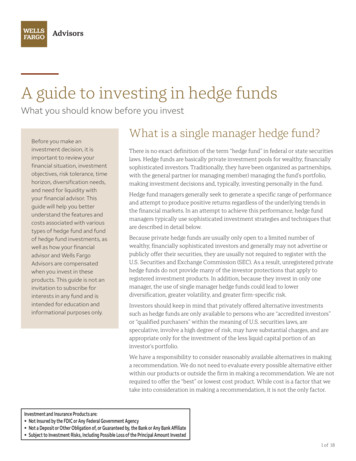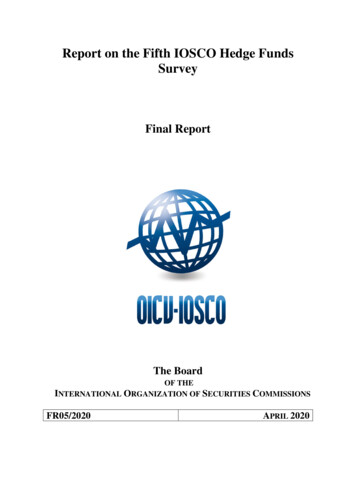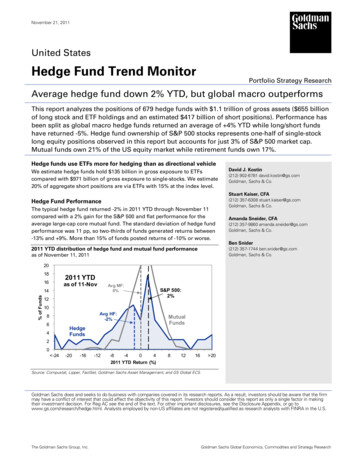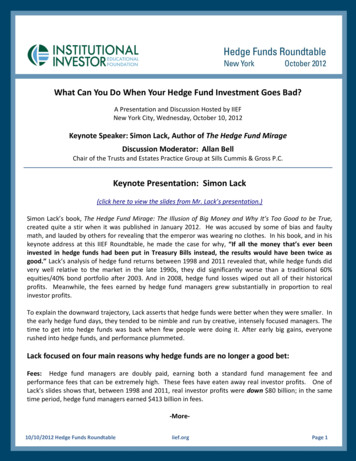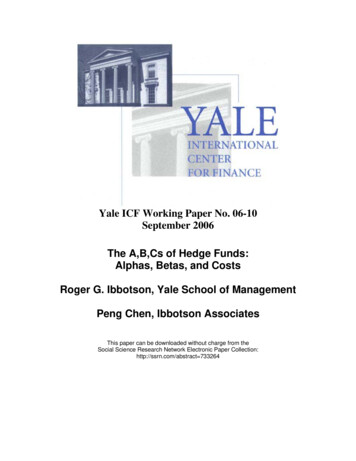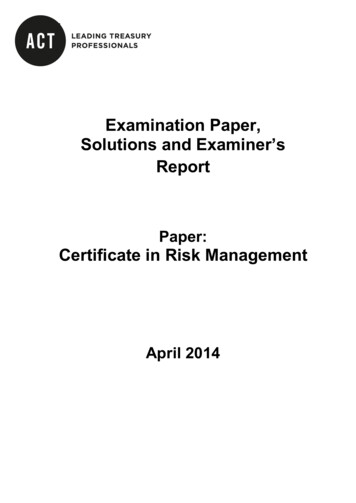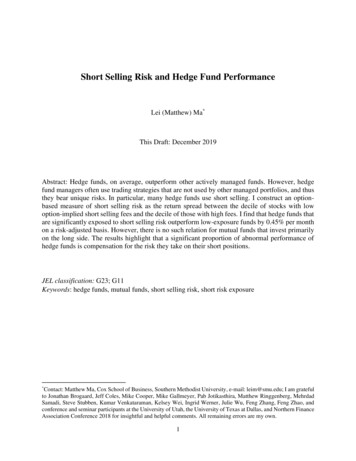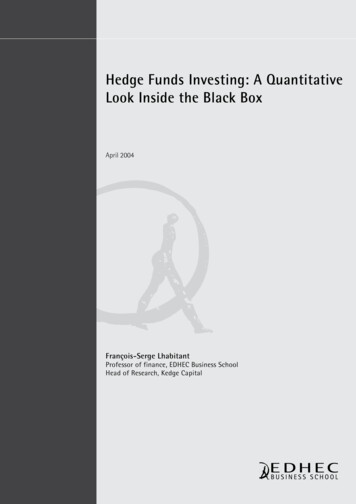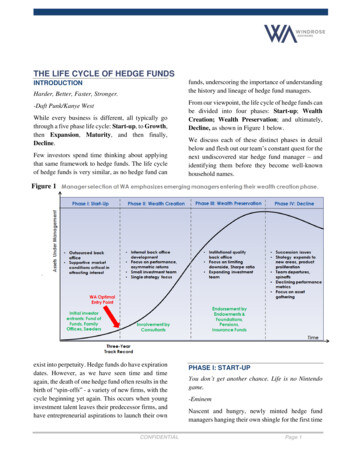
Transcription
JUNE 2015Do Hedge Funds MakeGood Neighbors?How Fannie Mae, Freddie Mac & HUDare Selling Off Our Neighborhoodsto Wall Street
This paper was written by Aditi Sen, with research support from Sarah Edelman, Marco Morales, Scott Fergus,Diane Cipollone and Bradford Murray. It was edited by Connie Razza, Lisa Donner and Amy Schur.ABOUT THE CENTER FOR POPULAR DEMOCRACYThe Center for Popular Democracy works to create equity, opportunity, and adynamic democracy in partnership with high-impact base-building organizations,organizing alliances, and progressive unions. CPD strengthens our collectivecapacity to envision and win an innovative pro-worker, pro-immigrant, racial andeconomic justice agenda.ABOUT THE ACCE INSTITUTEThe ACCE Institute was founded in 2010 and is dedicated to improving conditions inlow -and- moderate income communities in California by providing public educationand training in effective, community-based movement-building. The ACCE Instituteleadership development techniques to advance community-building work. TheInstitute works to increase the civic engagement of low –and – moderate incomecommunities by helping local organizations develop non-partisan civic engagementefforts that encourage active public citizenship and voting in low- and moderateincome communities. Additionally, ACCE Institute is providing trainings on importantpolicy issues impacting low and moderate income communities across the state, andproducing and disseminating materials that give everyday people the information theyneeded to inform their efforts to advocate for their communities.Cover photo: Ryan Dowd / Flickr (CC BY-SA 2.0) Modifiedis training both community organizers and community leaders in outreach and
Do Hedge Funds MakeGood Neighbors?How Fannie Mae, Freddie Mac& HUD are Selling Off OurNeighborhoods to Wall StreetIntroductionNearly eight years after the start of the global financial crisis, hedge funds and private equity firmshave found yet another way to make big profits: distressed housing assets. Often, the very samecorporate actors that precipitated the housing crash in the first place are buying and selling offdelinquent mortgages and vacant houses that are a product of the crash. Together, these Wall Streetentities have raised over 20 billion to buy the notes for as many as 200,000 homes in the UnitedStates.1 The newly consolidated single-family rental market is a lucrative business. A 2014 studyestimated that the four largest holders of these assets have seen as much as a 23 percent rate ofreturn on the properties they purchased in the last three years.2Meanwhile, low-income communities of color across the country have suffered. Millions ofAmericans lost all the equity in their homes or experienced the hardship of foreclosure during thehousing crisis and have not recovered from losing their greatest source of wealth. During the financialcrisis, the median net worth for African Americans fell 53 percent; for Latinos, it was a 66 percentdecrease. In contrast, median net worth for whites fell only 16 percent. While white families haveexperienced a rebound in wealth since the crisis, African-American and Latino families have not. 3Between 2006 and 2015, rates of homeownership have fallen while the number of single-familyhomes that are currently occupied by renters instead of homeowners has skyrocketed, up 31 percentto nearly 15 million renters in 2013.4 In the aftermath of the financial crisis, Wall Street’s investmentin single-family homes has burgeoned, often crowding out prospective homeowners. For instance, inApril 2015, one-quarter of all home sales were to cash-carrying investors; 5 in July 2013, cash-on-handinvestors bought roughly 55 percent of the homes sold in Las Vegas, Nevada; 6 and, in Richmond,California, between 2009 and 2012, about half of all home sales went to investors.7Major government and government-backed entities are fueling Wall Street’s increased control orownership of single-family homes. Both the Department of Housing and Urban Development (HUD)and the Federal Housing Finance Agency (FHFA), which oversees Fannie Mae and Freddie Mac, areauctioning off, often at a discount, tens of thousands of Non-Performing Loans that they want to getoff their books. The vast majority of these loans have gone to hedge funds and private equity firms,and in many cases the properties then end up in their hands. Although Fannie Mae and FreddieMac have been unwilling to offer principal reduction to struggling homeowners, they oftenoffer steep discounts when they sell these mortgages to Wall Street speculators.1
Do Hedge Funds Make Good Neighbors?An initial examination of four of the largest purchasers of HUD and FHFA loans has unearthed anarray of disturbing business practices, ranging from those that clearly run counter to the goalsof homeownership preservation and neighborhood stability to those that break laws, deceivehomeowners, and harm taxpayers more generally.The troubling record of these four large buyers raises serious questions about the HUD and FHFANon-Performing Loan sale programs–and argues for a very different approach. These institutions havean opportunity to sell their portfolios of distressed mortgages to purchasers that put the interests ofoccupants and neighborhoods first, instead of selling them to speculators.Community Development Financial Institutions (CDFIs) have developed programs to buy verydelinquent mortgages and offer a “restart” for struggling homeowners, by reducing principal downto current market value and otherwise modifying the loan. When these non-profits are not able toreturn homeowners back to good standing or they acquire vacant properties, CDFIs have a housingdisposition plan based on the affordable housing needs of the communities.In this paper, we review the track record, to date, of the HUD and FHFA single-family loan saleprograms. We, then, explore the troubling record of four of the top buyers of these loans, who arebenefitting from the way these loan sales are currently conducted.We recommend that both HUD and FHFA take immediate action to prevent the on-going sale ofdistressed housing assets to companies that have misled and cheated taxpayers and companies whosepractices are harmful to homeowners, tenants and communities. Specifically, HUD and FHFA should:1) Establish much higher standards and criteria for the kind of companies that areeligible to purchase delinquent mortgages.2) Prioritize companies that have a clearly defined program to offer permanentmodifications with principal reduction and to create affordable housing withvacant properties.Additionally, FHFA should themselves immediately begin to offer principal reduction in their ownmodification process.The Government Fire Sale of Delinquent Mortgages toWall Street Speculators and its Impact on HomeownersOf the “resolved” loans for which HUD has reported to date, fewer than 10 percent of homeownershave been able to keep their homes. HUD has released information on loan outcomes for over 79,000loans touting that 16,706 loans avoided foreclosure. However, a closer examination shows that thisfigure includes over 9,000 homes lost to original occupants through Deeds in Lieu, Short Sales orThird-Party Sales. The current occupants have been able to keep their homes in only 7,019 cases.8HUD has been selling some 20 percent of these mortgages through special “NeighborhoodStabilization Outcome” pools, or NSO’s. These pools are smaller and more geographicallyconcentrated. Purchasers are required to resolve at least half of the loans acquired in ways that HUDhas defined as helping to stabilize the community. However, allowable outcomes include results suchas “short sale” and “held for rental.” While a short sale is better for a homeowner than a foreclosure,occupants still lose their home and there is no particular benefit to the community. Holding propertiesfor rental, with no affordability guidelines, does little to address community needs.At the same time, the results from NSO pools are in fact better than the results from the general,national pools. One HUD program report indicated that NSO pools had 23.5 percent of resolved2
How Fannie Mae, Freddie Mac & HUD are Selling Off Our Neighborhoods to Wall Streetloans re-performing—over double that of the national pools. Non-profits won 12 percent of themortgages sold through NSO auctions (compared to less than 2 percent overall). The superior NSOprogram results demonstrate the benefit to homeowners and communities from having strongercriteria that purchasers must meet and having more of those purchasers be non-profits committed tomodifications with principal reduction.However, the NSO program does not go far enough. Non-profit bidders have faced barriers tocompetition with major financial players, since the sale is still awarded to the highest bidders with noweighting of the quality of the programs/bidders. Thus, the same Wall Street bidders tend to win onmultiple auctions and the same players win in the NSO pools as in the national auctions. Furthermore,the NSO pools are very small by design in order to allow smaller entities to place bids, but because ofthe limited number of NSO pools in total, very few loans in total have designated outcomes orientedtowards community investment criteria.Now, major bidders from HUD’s program are also showing up in the Fannie Mae/ Freddie Macpurchaser lists. Since introducing similar programs in the past year, Fannie Mae and Freddie Machave moved much more quickly than HUD. In May, Fannie Mae announced the sale of 3,200 loanswith 786 million in unpaid principal balance (UPB),9 all of which were awarded to One William StreetCapital,10 a hedge funded started by former Lehman Brothers mortgage securities executives.11Freddie Mac sold off over 7,000 delinquent mortgages worth over 1 billion through three sales,beginning in the summer of 2014.12 The first sale was an undisclosed number of loans with 659million in UPB, which went to investment firm Oak Hill Advisers. The second sale, for nearly 2,000loans with 392 million UPB went to Pretium Mortgage Credit Partners and Bayview Acquisition,which is affiliated with the Blackstone Group. The third and largest sale so far, for nearly 5,400 loans,went to an affiliate of private equity firm Angelo Gordon. In contrast, HUD’s first year of single familyloan sales covered only 410 home loans, with 98 million worth of UPB.Figure 1. Common bidders across multiple programsHUDNational PoolsNSO PoolsFannie MaePurchaserCountPurchaserCountLone Star Funds17066Bayview Asset Management6863Bayview Asset Management15205Oaktree Capital Management/DCResidential4772The Corona Group3678PurchaserCountSW Sponsor, LLC (OneWilliam Street Capital)710Neuberger Berman'sPRMF Acquisition LLC2358Total3068Angelo Gordon/GCAT Depositor2014-4, LLC7478Selene Residential Partners638425 Capital Partners2340RBS Financial Products54853504Pretium Mortgage Credit PartnersLoan Acquisitions, LP1115Kondaur Capital CorporationFreddie MacNeuberger Berman—PRMF3179MRF (Non-Profit)970PurchaserKondaur Capital Corporation601Oak Hill advisors LPundisclosedCommunity Loan Fund of NewJersey, Inc. (Non-profit)2615398Altisource Residential Corporation135GCAT Managementservices 2015-13 LLC(Angelo Gordon)49Pretium MortgageCredit Partners I LoanAcquisition LP1220CountOHA Newbury Ventures,LLC/MCM2917Varde Management, L.P./VMortgagea, LLC2909Credit Suisse/DLJ Mortgage Capital2747AMIP Management, LLCAltisource Residential Corporation1954Total25 Capital Partners1895Lone Star Funds1052PIMCO/LVS1528SW Sponsor, LLC (One WilliamStreet Capital)7551477Bayview AcquisitionLLCOthers3495Total7722320784Total84253
Do Hedge Funds Make Good Neighbors?In response to pressure by community groups and advocates, HUD announced reforms to theirmortgage-sale program in April of this year. They intend to auction more mortgages through theNSO pools described above and create more pools that are relatively small and geographicallyconcentrated. Additionally, HUD will have some non-profit-only auctions. No sales have taken placesince this announcement, so the impact of these changes is not yet known.Fannie Mae and Freddie Mac have done little to increase the likelihood that non-profits will be ableto win their loan sale auctions. They have announced that they will create some smaller pools, whichcould facilitate non-profit purchase. However, most of the smaller pools sold by HUD to date have stillgone to Wall Street speculators, so there is no reason for confidence that this program element willaddress the problem.Wall Street speculators use government programs to consolidatetheir hold on the profitable single-family market.Since 2012, HUD, Fannie Mae and Freddie Mac have sold off some 130,000 troubled mortgages.Less than two percent of all loan sales have gone to non-profits (Fig. 1). The vast majority have beensold to private equity firms and hedge funds.Figure 2. Top ten purchasers of loans sold through HUD, Fannie Mae or Freddie Mac poolsPurchaserLoans% TotalLone Star Funds22,55819%Bayview Asset Management22,82319%Angelo, Gordon12,87611%Selene Residential Partners6,8136%RBS Financial Products6,5736%Neuberger Berman—PRMF5,5375%Oaktree Capital Management/DC Residential4,7724%Kondaur Capital Corporation4,1053%25 Capital Partners4,2354%The Corona Group3,6783%Others23,85920%Total117,829It is, of course, no surprise that Wall Street speculators prioritize the needs of the community andtenants below returns to investors. While public officials have sought to reassure taxpayers thatthese purchasers have financial incentives to try to keep families in their homes, the actual programoutcomes suggest otherwise. Fewer than 10 percent of families have kept their homes under HUD’sprogram, as of February 2015.13 The same companies have bid repeatedly on pools of non-performingloans, with at least 10 winning multiple auctions. It stands to reason that such outcomes—with highrates of foreclosure, short sale, or deed transfers—are proving financially beneficial to investors.4
How Fannie Mae, Freddie Mac & HUD are Selling Off Our Neighborhoods to Wall StreetBusiness Practices of the Wall Street Entities Buying up HUDand FHFA MortgagesAn initial examination of the history and business practices of just four of the largest purchasers ofgovernment-held troubled mortgages to date—Lone Star Funds, Blackstone Group, Angelo, Gordonand Royal Bank of Scotland—reveals behavior that ranges from being harmful for communities tobeing unethical and illegal. The first three of these entities have purchased loans not only from HUD,but now, more recently, from Fannie Mae and Freddie Mac. Between them, the four companies havebought nearly 65,000 loans from government entities.Lone Star Funds appears to have a pattern of intentionally pursuingforeclosure of homeowners, failing to offer sustainable loan modifications,and aggressively driving up evictionsLone Star Funds is a private equity firm that manages 45 billion in assets.To date, it is the single largest buyer of non-performing loans from HUD andFreddie Mac, having purchased the notes for over 22,500 homes across thecountry. Its CEO, John Grayken, has a net worth of 5.2 billion.143 John Greyken, Founder and Chairman, Lone Star FundsThe approach to modifications taken by Caliber Home Loans, a subsidiary of Lone Star Funds,does not appear to prioritize sustainable relief to struggling homeowners.15 Nor does it seem thatCaliber passes on enough of the benefits of buying these loans at a discount to homeownersor communities. In multiple cases, Caliber has offered principal forbearance instead of principalreduction, despite the fact that Caliber bought the loans for less than the unpaid principal balance.Principal forbearance creates a balloon payment that has to be paid if the home is sold, the loanrefinanced, or when the loan matures, which can make it difficult for homeowners to refinance or sellif they need to.Additionally, Caliber often offers temporary loan modification terms with “five-year interest-only;”these terms meant that homeowners are not paying down principal at all and will owe as much afterfive years of payments as they did when they began the process. These terms diverge from the HomeAffordable Modification Program (HAMP) or industry-standard permanent modifications. Caliber’smodification scheme is considerably less beneficial to those homeowners who must resume makingfull payments of principal and interest and whose original interest rate is higher than the temporarilymodified rate. This becomes particularly challenging in year six and beyond for homeowners whoseterms contain an adjustable interest rate. Without principal reduction, a modification with only atemporary interest rate and interest-only payments does nothing to mitigate payment shock at theend of the rate reduction period. As a result, modifications from Caliber are less likely to preservehomeownership than loan modifications from many of the other large servicers in the country whofollow better standards.16Individual cases also point to a business approach that is not in the best interests of homeowners.A Pennsylvania couple stated that this subsidiary of Lone Star Funds took intentional actions to forcedefault by rejecting payments and miscalculating payments that had been made. The couple admitteddefault, but the judge ruled in favor of the homeowners, saying that their unsuccessful attempts tocontinue to pay was a reasonable defense.17A man in Detroit was on the brink of eviction and tried to buy back his home from Caliber, but,according to the man, Caliber had not returned calls from the man or his lawyer since they originally5
Do Hedge Funds Make Good Neighbors?announced their intent to evict. The homeowner had acquired a non-profit loan to finance his homerepurchase, which could not go forward until Caliber confirmed its intent to sell him back the home.18Numerous Consumer Affairs complaints about Caliber and Vericrest Financial (the company’s previousname) suggest that these are not isolated incidents but rather a clear part of Lone Star’s businessmodel. These complaints include allegations that Lone Star affiliates tried to foreclose without noticeor after only one late payment. They frequently allege that Caliber and/or Vericrest took homeowners’payments but never updated their status or applied them to their accounts.19RBS has a record of criminal activity and appears to have engaged in willfuldeception of public entities and in predatory practices targeting small businesses.Ross McEwanCEO, RBSThe Royal Bank of Scotland Group has at times been the largest bankin the world and currently has total assets of 1.6 trillion.20 RBS FinancialProducts, Inc., an affiliate of the Royal Bank of Scotland (RBS), has purchasedover 5,000 distressed single family mortgages from HUD. In 2014, RBSbooked a 5.4 billion loss, but said it paid 64.5 million in bonuses that year.21RBS continues to be 81 percent owned by the UK government, after it wastaken over during the financial crisis in 2008. In 2015, Ross McEwan returnedhis 1.5 million “role-based” shares incentive, but still netted 4.1 million intake home pay.22In early May of this year, a Federal judge ruled that RBS broke the law by misleading housing agenciesFannie Mae and Freddie Mac when it sold them mortgage bonds that involved loans that wereimproperly underwritten. The judge even asserted that “the magnitude of falsity, conservativelymeasured, is enormous.” Damages could total up to 500 million.23Also in May, the bank pleaded guilty to criminal charges for colluding with other banks to rig theforeign exchange currency rates to enrich themselves at the expense of their clients and—as theforeign exchange currency rates affect global commerce—the global economy. These practices wenton for over a decade.24 Fines in the case are expected to come to 1 billion.25In 2013, a report by an adviser to England’s business secretary alleged that in some cases, RBSforced business customers to default on loans so that the bank could charge higher fees or seizetheir properties and sell them.26 They also willfully misled small business owners in the UK about loanterms for taxpayer-backed loans.27 The claims are currently being investigated by the UK’s FinancialConduct Authority. RBS subsequently admitted that two executives made misleading statementsabout the business division when presenting evidence to a parliamentary committee regarding thepredatory practices.28These are not isolated incidents. RBS has a history of breaking the law in ways that injurehomeowners, communities, and the broader public. In 2012, the Royal Bank of Scotland entered asettlement agreement in a case brought by the State of Nevada Attorney General for the bank’s rolein peddling subprime and adjustable-rate mortgages to homeowners across Nevada between 2004and 2006. In the settlement, RBS agreed to pay 42.5 million to go towards payments for affectedhomeowners, as well as mortgage-fraud enforcement, foreclosure prevention, and attorney fees andcosts.29 RBS is now prohibited from securitizing any further mortgages within the State of Nevadaunless it engages in a reasonable review of the loans and determines that lenders disclose variablerate terms to the borrowers.30 In another lawsuit for securitizing unfair subprime and adjustable-ratemortgages (during 2006 and 2007), RBS settled with the State Attorney General of Massachusetts,for 52 million, with funds going towards principal reduction and other relief for hundreds of subprime6
How Fannie Mae, Freddie Mac & HUD are Selling Off Our Neighborhoods to Wall Streetborrowers, to the State of Massachusetts, and to local entities including municipalities that were themost affected by foreclosures stemming from the RBS-securitized loans.31Blackstone Group has a business model that puts risk on the backs of tenants.They fail to maintain their single-family rental portfolio, have unresponsivecustomer service and engage in abusive, mismanaged eviction practices.Stephen SchwarzmanCEO, BlackstoneGroupThe Blackstone Group is one of the world’s largest private equity firms, with 266 billion in assets under management.32 The firm specializes in leveragedbuyouts, but since the financial crisis, it has also spent nearly 7.5 million topurchase the 40,000 single family homes it manages as rentals across theUnited States.33 In 2013, Blackstone collected 4.7 billion in performancefees—70 percent of which came from its real estate segment. Blackstone’snet income in 2013 came to 2.9 billion. The following year, CEO StephenSchwartzman was paid over 690 million—the largest ever annual paymentfor a CEO of a public company.34Blackstone Groups holds a significant share in Bayview Acquisitions LLC,35 which has bought nearly24,000 non-performing loans through HUD’s Distressed Asset Sales Program (DASP), making itthe second largest buyer in the program.36 Blackstone Group also owns Invitation Homes, a singlefamily property management subsidiary established in 2012, which already has a bad record ontenants’ rights.37In Chicago, Invitation Homes has required tenants to rent property “as is.” Although such terms aresometimes allowed in commercial leases, they are not standard in residential leases. The propertymanagement company has also used leases that aim to indemnify Invitation Homes from anydamages, including those caused by its own negligence. These terms are likely in violation of localhousing laws and Illinois’ Landlord and Tenant Act.38 Such “as is” rentals and indemnification clausesshift the risk and expense of ownership to tenants.In addition to imposing such unscrupulous terms, Blackstone Group fails to maintain their rentalportfolio. Tenants who have moved into Invitation Homes properties across the country havedescribed that the company failed to carry out the renovations they had promised upon lease signing.Renters have faced significant problems, including plumbing issues, broken water heaters and airconditioners, and infestations of rodents and insects.39 A 2014 study of 1,400 Invitation Homes’renters in Los Angeles and Riverside, California, found widespread maintenance issues. Nearly halfof all residents interviewed (46%) reported that they had problems with plumbing, 39 percent hadissues with roaches or insects, and 22 percent had had problems with rodents or termites. Overone-fifth reported issues with heating or air conditioning, 20 percent reported problems with mold,18 percent reported having roof leaks, and 19 percent reported experiencing other problems with theconditions of their homes.40Individual legal actions also provide a glimpse of serious problems with Blackstone Group’s practicesas a landlord. In one instance, a couple in Los Angeles are suing Invitation Homes for uninhabitableliving conditions after they tried to rent a home from the company but found the residence to beuninhabitable (including the presence of mold, water leaks, and roaches) and Invitation Homesrefused to make repairs. Invitation Homes also changed the locks on the place after the couple movedout so that they were unable to retrieve their personal belongings for a period. However, InvitationHomes continues to demand rent because their lease requires the tenants to pay rent while they donot occupy the property.417
Do Hedge Funds Make Good Neighbors?Invitation Homes also engaged in a wrongful foreclosure of a man in Orange County, Florida. Thecompany tried to evict the occupant even though a judge had cancelled the foreclosure order and,therefore, Invitation Homes never rightfully owned the property. Also, letters sent by Invitation Homesto the homeowner included false information (e.g., that an eviction had been filed against him).42Angelo, Gordon Inc. is one of the largest investors in non-performing singlefamily loans, yet has little interest in protecting American homeowners. It hasrepeatedly taken a position opposing settlements that provide consumer relieffor America’s homeowners and has engaged in ethically questionable businesspractices and political contributions.In the first quarter of 2015, GCAT Management Services LLC 2013-15, anentity affiliated with hedge fund Angelo, Gordon Inc.,43 purchased over5,000 non-performing loans worth 1.08 billion from Freddie Mac.44 Relatedentities have purchased over 7,400 from HUD.45 Founded in 1988, Angelo,Gordon currently manages 27 billion in assets.463 John M. Angelo, CEO, Angelo GordonIn 2008, the US Senate Committee on Homeland Security and Government Affairs investigatedAngelo, Gordon & Co for tax evasion. The company was one of three asset managers brought beforethe Permanent Subcommittee on Investigations shortly before the acceleration of the 2008 U.S.financial crisis. The hearings focused on the use of “total return swap contracts,” which allowedAngelo, Gordon & Co. to receive income as though they owned a security while avoiding that level oftaxation. The use of these swap contracts was part of the controversial “Cayman Islands Trade” thatallowed offshore financial institutions to dodge U.S. taxes.47 During the course of the Congressionalhearing, Angelo, Gordon managing director Gary Wolf admitted that, while Angelo, Gordon & Co. waslegally domiciled in the Cayman Islands, they did not employ a single person in that country.48In addition to their interest in distressed mortgages, Angelo, Gordon & Co. is one of the many U.S.asset managers who have snapped up Puerto Rico’s distressed municipal bonds, in the hopes ofextracting huge sums if Puerto Rico’s public power authority fails to be able to pay their creditor.49Angelo, Gordon & Co. is taking active steps to use their clout in Congress to help position itselffor extractive debt plays in Puerto Rico. The company lobbied against the Puerto Rico Chapter 9Uniformity Act of 2015, which appears to have been a bipartisan attempt by Puerto Rican legislatorsto alter their bankruptcy code to prevent debt vulturism around the island’s heavily indebted publicutility authorities.50 51 52Jonathan Lieberman, managing director of Angelo, Gordon, has been sharply critical of publicattempts to protect homeowners from foreclosure proceedings abuses through tailored regulation. In2012, a settlement agreement was reached between the big five banks and their mortgage servicingsubsidiaries, the U.S. Departments of Justice and Health, Education and Welfare, and 49 of the 50states’ attorneys generals, regarding alleged mortgage servicing and foreclosure processing abuseson the part of banks and their servicers. On this occasion, Lieberman made a statement on behalf ofthe Association of Mortgage Investors in which he stated that for Angelo, Gordon and other membersof the Association, their “primary mission [was] to invest in mortgages on behalf of Americaninvestors.” He went on to assert thatCapitalism and credit standards require people and institutions to honor contractualobligations, act responsibly and to unfortunately also to fail in order to cleanse the systemof the lowest common denominator. At its root, credit is a privilege, not a right and not8
How Fannie Mae, Freddie Mac & HUD are Selling Off Our Neighborhoods to Wall Streetdemocratically allocated. You earn credit which allows you to borrow tomorrow’s money topay for something you get today.53This account disregards the explicitly predatory lending practices of the finance industry, usingrhetoric to try to place the entire burden of failed mortgages on homeowners. Through statementslike these, Angelo, Gordon has demonstrated that not only is its business model ideologicallyopposed to protections enacted to serve low-income American homeowners, but that it sees acontradiction between its fiduciary interests and the public’s interest in preventing foreclosures oroffering greater protection to homeowners.Despite the company’s opposition to consumer relief, it
CENTER FOR POPULAR DEMOCRACY . The . Center for Popular Democracy. works to create equity, opportunity, and a . States.1 The newly consolidated single-family rental market is a lucrative business. A 2014 study . loan sales covered only 410 home loans, with 98 million worth of UPB. Purchaser. Count: Lone Star Funds:
